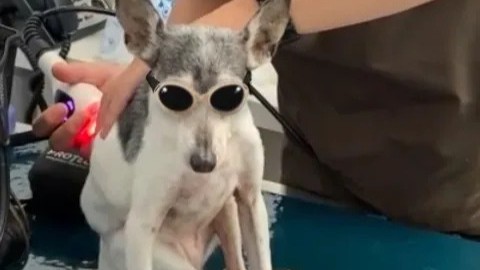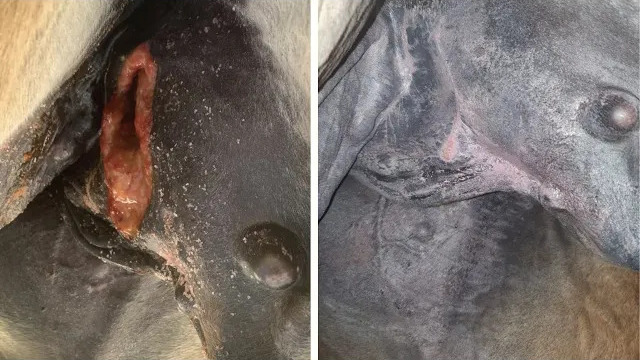MLS Laser Therapy
Clinically Validated, Drug-Free Pain Relief
The most advanced therapy laser emission system available to veterinary professionals.

Overview of Laser Therapy
Laser therapy, one of the fastest-growing modalities in veterinary medicine, is a painless and non-invasive treatment that uses specific wavelengths of light to stimulate cellular activity, promoting healing, reducing inflammation, and relieving pain.
The therapy works through a process called photobiomodulation (PBM). Laser light penetrates the skin and is absorbed by the mitochondria in cells, boosting ATP production. The increased cellular energy triggers a cascade of biological effects resulting in accelerated tissue repair, improved circulation, and reduced inflammation.

The MLS Difference
The patented Multiwave Locked System (MLS) is a unique type of Class IV therapy laser that precisely synchronizes two wavelengths of infrared light to enhance biostimulatory effects while minimizing the risk of thermal damage, allowing for more effective and safer treatments.
The efficacy of a Class IV therapy laser without generating heat.
40 Years of Research and Innovation
MLS Laser Therapy was developed and tested through rigorous biomedical and clinical research, including in vitro, in vivo, and controlled clinical trials by leading health organizations around the world.


Patented MLS® Pulse
The patented Multiwave Locked System is revolutionizing laser therapy as the only technology to precisely synchronize continuous and pulsed emissions maximizing penetration depth and optimizing clinical outcomes.
Enhanced Safety Profile
The MLS emission system modulates energy output based on customizable treatment parameters to ensure the most accurate therapeutic dose delivery while minimizing the risks associated with many other higher-power Class IV technologies.

Patented Pulse Pattern
Continuous 808 nm
Decreases inflammation by stimulating blood flow and lymphatic drainage, inducing the reabsorption of fluid buildup, and interactive with the synthesis and degradation of inflammation mediators.
Pulsed 905 nm
Affects the transmission of pain at the level of superficial nociceptors and on the afferent nervous fibers, resulting in an increase of the cell and nervous fiber’s stimulation threshold and therefore a reduced sensation of pain.
Synchronizing these wavelengths with the patented Multiwave Locked System® produces an immediate and long-lasting synergistic effect while ensuring the deepest possible penetration.

Customize Your Aproach
with different treatment modes

Scanning
Evenly distribute focused laser energy to an intended area.

Point-to-Point
Precisely direct laser energy to a specific spot without fear of generating heat.

Trigger Points
Use the on-screen trigger point locator to assist in a monogenous approach to treating trigger points.
Indications for Use
Veterinary professionals are using MLS Laser Therapy to successfully relieve pain and inflammation associated with a wide range of acute and chronic conditions for a variety of animal species:
- Musculoskeletal system trauma, including sprains and strains
- Degenerative illnesses or articular or neuromuscular origins
- Inflammatory conditions
- Edema due to circulatory stasis, reduced lymphatic drainage, or trauma
- Superficial lesions and post-surgical healing
- And other painful conditions of various origins
Biological Effects
Primary
Direct transfer of energy to the biological sublayers (endogenous or exogenic chromophores).
- Enzymatic activation
- Increase in ATP production
- Modulation of cellular metabolism
- Effect on pain perception threshold
Photothermic interaction is based on the conversion of option radiation into thermal energy which, at a microscopic level, occurs through the inelastic encounter between excited molecules following the absorption of photons.
- Increase in circulation
- Increased supply of oxygen and nutrients
The absorption of energy involves the formation of mechanical waves.
- Production of an extracellular matrix (important in tissue repair & regeneration)
- Acceleration of lymphatic peristalsis
- Re-absorption of edemas
- Reactivation of microcirculation
Secondary
- Increase in ATP synthesis
- Increase in the production of RNA
- Increase in cellular proliferation
- Induction of differentiation processes
- Release of growth factors (fibroblasts) and other substances
- Increase in the production of molecules of the extracellular matrix (fibroblasts & condrocytes)
- Modulation of the inflammatory processes
- Remodeling of the extracellular matrix
- Induction of lymphatic and vascular regeneration
- Stimulation of the endothelial function
- Reduction of the edema re-absorption times
- Prevention against the formation of scar tissue and hyperkeratosic lesions
- Blocking of pain stimulus conduction
- Hyperemia and “wash out” of the algogenic substances
- Increase in endorphin synthesis
- Pain threshold modulation
- Increase in the caliber and modulation of lymphatic and capillary vessel permeability
- Hyperemia and “wash out” of the pro-inflammatory molecules
- Increase in the supply of nutrients, oxygen and growth factors
- Cellular function activation
- Modulation of cell proliferation and differentiation (e.g., nerve regeneration)
- Increase of matrix protein synthesis
- Reduction of scar tissue formation
TESTIMONIALS
What Our Customers Are Saying
"The MLS Laser Therapy has been a great addition to our new rehabilitation center. It allows us to safely use this modality in orthopedic cases without the concern of metal implants, treat degenerative joint disease, trauma, and many other therapies, including acupuncture for those patients not tolerating the needles. We no longer have to keep the laser constantly moving, which is very nice for our more energetic patients. "
Dr. Nancy Peterson
Ingersoll Animal Hospital
"Purchasing this laser has enabled us to provide a variety of services to our clients that are exclusive to the area and has provided elevated care for many of our patients. With the support of Cutting Edge and the multiple functions of the laser, we have improved the medicine offered to our patients."
Rebecca Caudle, Hospital Manager
Macedon Veterinary Care
"We have seen significantly more reduction in pain for cervical cases over the Class 3B laser or acupuncture treatments used previously."
Kristin Browne, DVM
Thera-Vet Acres Rehabilitation And Fitness
"I feel extremely comfortable with this laser being used by my veterinary technicians who have been trained in its use. Similar to traditional medication, I prescribe a dose of laser and route of administration, and the veterinary technician administers the treat."
Kristin Kirkby, DVM, MS, CCRT, DACVS
Seattle Veterinary Specialists
KNOWLEDGE CENTER
Featured Posts
FAQs
MLS Laser Therapy uses a patented emission system based on decades of research. It is the only therapy laser that precisely synchronizes two wavelengths of light energy chosen for maximum effectiveness in reducing pain and inflammation deep within the body. While other light-based therapies may only penetrate superficial tissue, MLS Therapy Lasers can target deep tissue, including joints.
Additionally, this patented emission system offers a higher safety profile than many other Class IV therapy lasers on the market. This allows patients and practitioners to benefit from the efficacy of a high-power laser without the risks associated with other Class IV technologies, such as thermal collateral tissue damage.
This enhanced safety profile enables practitioners to administer laser therapy using scanning or point-to-point treatment methods without risk of burning their patients.
Yes. MLS Therapy Lasers are a unique type of Class IV laser that use a patented emission system with a higher safety profile than other Class IV therapy lasers on the market. This allows patients and practitioners to benefit from the efficacy of a high-power laser without the risks associated with other Class IV technologies, such as thermal collateral tissue damage.
While the number of treatment sessions needed may vary depending on the patient, their diagnosis, and the chronicity of their pain, most providers find success with the following treatment packages:
- 6 treatment sessions for acute pain.
- 10 to 12 treatment sessions for chronic conditions.
- 6 to 12 for post-surgical recovery.
The effects of laser therapy are cumulative, and it is recommended that treatment sessions be administered 2 to 3 times per week for 2 to 3 weeks. A typical treatment can last between 5 to 15 minutes, depending on the size and number of areas being treated
Some chronic conditions may require maintenance sessions on a monthly or bimonthly basis after their initial treatment package.
MLS Laser Therapy has no known negative side effects. It is non-invasive, requires no downtime, and, unlike many pharmaceutical pain killers and anti-inflammatory drugs, MLS Laser Therapy is non-habit-forming.
MLS Laser Therapy was developed and tested following a strict course of biomedical and clinical research. The effectiveness of the combined emissions was initially tested in vitro, in vivo, and by means of controlled clinical trials run by major state-of-the-art health organizations for treating traumatic and degenerative painful diseases.
Italy’s University of Turin’s biology department, as well as Brazil’s University of Padova’s departments of biology and anatomy, have studied and verified that the clinical effectiveness of the MLS pulse provides more efficient biostimulatory results with less energy in considerably reduced times in comparison to traditional low-level laser therapy.
For more information about the research and development of MLS Laser Therapy, download the Scientific Report.



